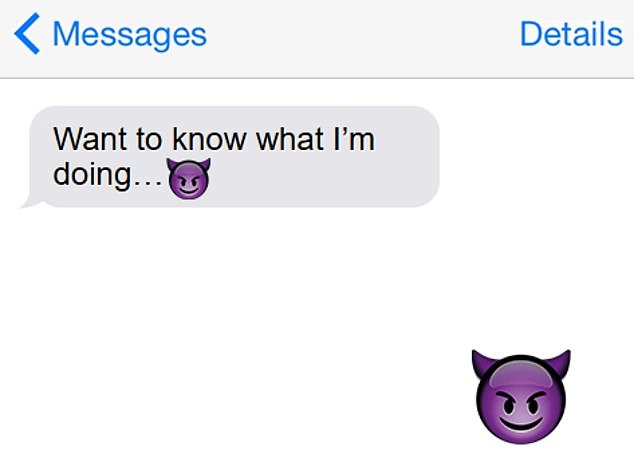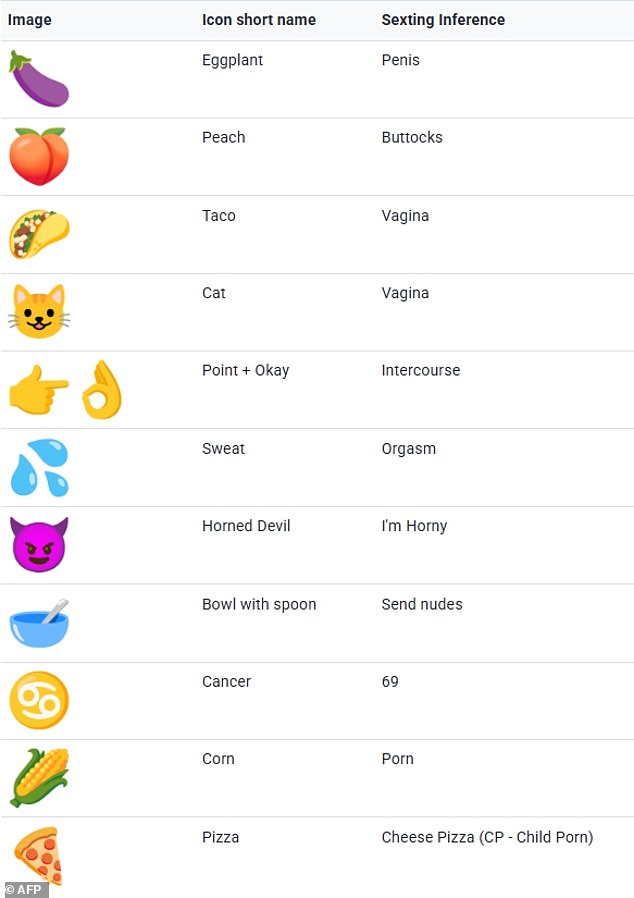Police have issued a grim warning over the emojis predators use online when they talk to Aussie kids – and why something as simple as a bowl and spoon or slice of pizza could allude to something much more sinister.
According to the Australian Federal Police there are some go-to emojis used by creeps online.
And it isn’t just the well-known corn, peach or eggplant pictures which represent porn, bottoms and penises that people should worry about.
‘Emojis and acronyms are commonly used by Australian children and young people in online communication and are usually harmless fun, but some have double meanings that may seem trivial but can be quite alarming,’ AFP Commander Human Exploitation Helen Schneider said.
‘For example, the experience of our specialist investigators has shown that in some situations, emojis such as the devil face could be a sign your child is engaging in sexual activity online.
‘More worryingly, the phrase “catching a case” is being used by offenders to show their willingness to be arrested and charged for their abhorrent interactions against someone who is often underage or in a position of vulnerability.’
According to the country’s top cops the taco emoji and kitty emoji reference vaginas and the sweat emoji could be used to represent an orgasm.
Parents have also been told to watch for the cancer symbol, which means the 69 sex position and the pizza emoji or references to cheese pizza which could be a reference to child abuse material (CP).

The bowl and spoon could be a request for the other person to send nudes and the devil emoji could be referencing the other person ‘feeling horny’.
The police revealed the list in an attempt to keep kids safe, they also shared a list of obscure acronyms which parents need to watch out for.
Code 9 or CD9 is a reference to parents being around, P911 means parent alert and POS means the parent can see over their shoulder.
Other even more dangerous messages include GNRC means get naked right now and Rule 34 which says any topic can be made into pornographic content.
Police are also urging parents to ‘know what their children are doing online’.
This means knowing who they interact with and what platforms they have access to.
‘It is important to stress that in most cases, it is probably nothing to worry about, but having open conversations with your children about their online safety can avoid the desire to embrace emojis and acronyms that might have more sinister meanings,’ Commander Schneider continued.
They also suggest checking privacy settings on apps – and say parent and carers may need to turn off location settings and chat settings manually.

And, importantly, parents need to be approachable so if their kids do get into awkward or dangerous situations online they feel they can talk about it without getting in trouble or having their devices taken away.
The police made a video showing off some of the problem emojis and it quickly went viral.
‘This kind of information is really helpful, please make more posts like this,’ one woman wrote, earning over 700 likes.
‘I would never have guessed that the octopus and bowl with spoon meant anything other than octopus and bowl with spoon. It’s so tricky these days to keep up with all the hidden meanings!’ said another.
‘I would give you a thumbs up but don’t know what that means anymore,’ added a third.
Another person’s joked there should be courses on emoji use – admitting she has used the bowl and spoon to let people know dinner is ready.
‘Wouldn’t want to send friends and family the wrong message,’ she said.
In the 2023-24 financial year, the ACCCE received 58,503 reports of online child sexual exploitation.
Parents and concerned adults can head to the ACCCE website to report anything suspicious and to keep updated with latest measures to keep children safe online.
ThinkUKnow is an AFP-led resource that helps parents, carers, educators, children and young people develop good online habits that protect children and deter offenders.
